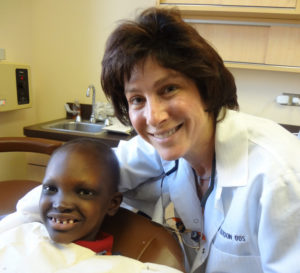
Good care means treating the whole body. Since the ectodermal dysplasias can affect numerous parts, you may need a team of care providers to treat the various symptoms.
Finding an Expert
An “expert” in ectodermal dysplasia doesn’t really exist. Because the conditions are rare, most doctors or dentists typically do not see enough cases to be considered an expert. Or, the doctor may only treat one aspect, such as the skin, and would not be able to treat the teeth.
While it would be ideal to find a doctor who is experienced and knowledgeable about ectodermal dysplasias, it is not always possible to find one with experience nearby. The key is to find a doctor willing to learn about the conditions.
A primary care doctor such as a family medicine doctor, an internist or a pediatrician, who understands your needs, can be a valuable partner for your health care. They can help coordinate your care, especially if you need to see different specialists for multiple health problems.
For most people, a board-certified family medicine doctor or internist is a good choice for primary care. For children and teens, that means a board-certified pediatrician or family medicine doctor. Family doctors, internists, and pediatricians have knowledge about many common medical problems. However, you’ll want to ensure your doctor is willing to learn the specifics of your ectodermal dysplasia.
Do you have a doctor or dentist you like? Recommend them now. We’ll add them to our list that we provide families.
I called both of the prosthodontists on the (NFED) list and they are both familiar with ectodermal dysplasia. It was almost a pleasure to not have to explain everything all over again to someone on the other end of the phone. – Monica
Your Healthcare Team
The first step in choosing the right health care providers is determining the health challenges that you face. In addition to your primary care physician or pediatrician, your team may include:
- Dermatologist
- Dentist
- Ear, Nose and Throat Doctor
- Ophthalmologist
- Obstetrician/Gynecologist
- Orthopedic surgeon
- Craniofacial surgeon
- Nutritionist
- Speech Therapist
- Occupational Therapist
- Psychologist
- Social Worker
- Other Specialists
Questions to Ask Your Doctor
Before you choose a doctor, look online or call to ask a prospective doctor what process to follow to discuss your questions. Tell the receptionist that you are looking for a new doctor. Here are some questions you may want to ask:
- Is the doctor accepting new patients?
- Is the doctor board-certified?
- Where did the doctor get his or her education and training?
- Which hospitals does the doctor work with?
- Who fills in for the doctor when he or she isn’t available?
- Does the doctor belong to my health insurance plan, and will the office bill my insurance for me?
- What types of patients does the doctor see?
- What can the doctor do on the first visit?
If you’re satisfied with all of these answers, it’s time to schedule an appointment. During your first visit, tell your doctor that you would like to share in making treatment decisions. Pay attention to how you feel during the visits, and think about these questions:
- Does the doctor listen well and answer your questions?
- Does the doctor know anything about ectodermal dysplasia? If not, is he or she honest about this and willing to learn?
- Does the doctor use terms you can understand and explain things clearly?
- Does the doctor spend enough time with you?
- Can you build a good working relationship with the doctor?
- Does the doctor encourage you to take an active part in your care?
- Will the doctor give you alternate treatment options?
It may take more than one visit for you to find out whether or not you can partner well with your doctor. It’s important to be patient and talk with your doctor or dentist about being a partner in your health decisions. Consider taking these pieces of NFED information with you.
Use our tips for finding a doctor or dentist who is right for you. Here are eight things you should expect from your dental care team.